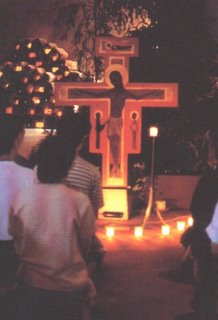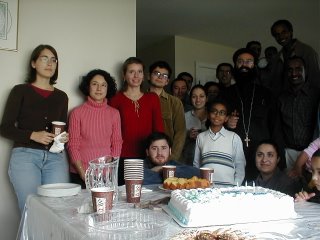Taize - one year after
Remembering Taize
A year ago, 5 Middkids undertook a bold adventure; they decided to go to Taize, a small village in the South East France, close to the city of Lyon. Said and done. From Ireland, France, and Spain, we all went to...Taize. It was the last weekend in October, when Taize gets filled with young high-school kids from all over France. It was a journey by the end of which each of us had faced challenges and found the vastness of the divine dimension...and how sometimes answer come at a later date. Or, we become more mature and are able to understand the meaning of our experiences and encounters with God later in life.
What is Taize, after all? It is...a place where those in search for a meaning of this life can find refuge in prayer. Simply put. But Taize is so much more, it is a hallmark of freedom, tolerance and inclusiveness. And what makes Taize are the millions of people that go summer after summer, autumn after autumn, spring after spring. People come from all corners of the world, speaking a variety of languages and yet they understand each other in the language of prayer.
Taize means so much to me. And note that I have not included "winter after winter" in the above paragraph. In winter, Taize goes to the people, instead. Each December a European meeting takes place, in cities such as Warsaw, Barcelona, Budapest, Paris, Hamburg, Lisbon, Milan, etc. I have attended three of the above, and two summer meetings in the past. Coming back to Taize in the fall of 2005, especially in the extraordinary circumstance of not having my church group from Bucharest with me posed a new challenge and a liberation. On the surface, Taize was the same. Actually not. Taize will never be the same without its founder, brother Roger. For those who have met him, have listened to his quiet and bland voice read the Scriptures, for those who have been blessed by him, we will always miss him. [Brother Roger of Taize passed away in August 2005; he was the victim of a Romanian deranged woman who stabbed him in the middle of a group prayer, in the main church.] His fate was so cruel, and we Romanians have mourned him greatly. In the aftermath of the collapse of the Communist regime, it was brother Roger who came to Romania and initiated talks with priests from churches St. Silvestru and Stavropoleos in Bucharest, aimed at organizing pilgrimages for young Romanians. He opened a door for us, despite the fact we were a minority of Orthodox people among Catholics and Protestans found in Taize at the time. To this day, Romanians continue to be the sole major Orthodox people going to Taize.

Brother Roger
Below is a passage I found on the Taize website: www.taize.fr
"Romanian Orthodox in Taizé
A “bridge” between East and West
Once ag
 ain this summer (2006, n.a.), hundreds of young people from Romania spent a week in Taizé.
ain this summer (2006, n.a.), hundreds of young people from Romania spent a week in Taizé.The great diversity of the inhabitants of that country was visible: Orthodox, Latin and Eastern-rite Catholics, Reformed Christians, Hungarians from Transylvania…
Most of the population of Romania is Orthodox and that is visible in Taizé. The Romanians are the only Orthodox who speak a Romance language. They feel that they have the responsibility of being a “bridge” between East and West. Once or twice a week, the Divine Liturgy of Saint John Chrysostom was celebrated in Romanian, in the small village church. The liturgy is at the heart of their life of faith: for two hours everything stops, as if heaven touched earth. The life of the women and men of our time is presented to God, with their cares and their sorrows, and people leave “bearing peace”. The Byzantine tradition is rich and beautiful. Some young people say that in Taizé, paradoxically, they were able to begin to rediscover the beauty of the treasure which is theirs and to have the desire to go deeper, to go to the source of this life and this joy present at the heart of the praise of God’s people. We have recorded the testimonies of three young people from Bucharest.
"In general, people in Taizé do not know that the great majority of the Romanian people are Orthodox. But very quickly, we realize that barriers between denominations fall, and what matters is that we are all Christians."
http://www.taize.fr/en_article3983.html
Iulia




